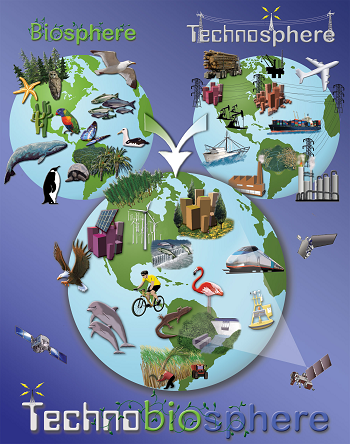The Sustainable Technobiosphere Project

The biosphere is defined here as a complex adaptive system that includes all life on Earth's surface. It has persisted for over 3 billion years. The technosphere is the globe-girdling web of human artifacts including buildings, machines, roads, and electronic devices. Like the biosphere, the technosphere follows a thermodynamic imperative to use energy in the service of maintaining and increasing order.
The technobiosphere is a contemporary fusion of the biosphere and the technosphere. Energy inputs to the coupled system are a combination of solar energy and fossil fuels. The technosphere impacts the biosphere directly by way of agriculture, forestry, and fisheries management. Indirect effects are manifest in myriad ways including changes in the atmosphere and the hydrosphere. The biosphere impacts the technosphere by its supply of raw materials, notably wood and biofuels. A key mode of interaction between the biosphere and the technosphere is the global carbon cycle.
Sustainability refers to the ability to manage natural resources such that all humans currently living on the planet share at least a modest standard of living without compromising the potential of those resources to provide equal benefits to future generations. We have really just begun to understand what sustainability means at the level of ecosystems, landscapes, bioregions, and globally. Beyond the challenge of achieving sustainability under a stable climate is the challenge of dealing with a rapidly changing climate.
To achieve a sustainable technobiosphere will require that humanity learns to self-regulate its population and learns to use natural resources without degrading them. Natural resource management schemes typically include a monitoring component, and the Earth Science community is just recently gaining a capacity for monitoring the terrestrial biosphere ─ a step towards its management at the global scale. My particular interest is in using satellite remote sensing and modeling to monitor land cover/land use, vegetation productivity, and vegetation-driven carbon flux.
Documents
- Turner, D.P. 2018. The Green Marble: Earth System Science and Global Sustainability. Columbia University Press.
- Turner, D.P. 2005. Thinking at the global scale. Global Ecology and Biogeography 14:505-508.
- Turner, D.P. 2011. Global Vegetation Monitoring: Towards a Sustainable Technobiosphere. Frontiers in Ecology and the Environment 9:111-116.
- Turner, D.P. 2011. A Lexicon of the Spheres. Unpublished glossary.
